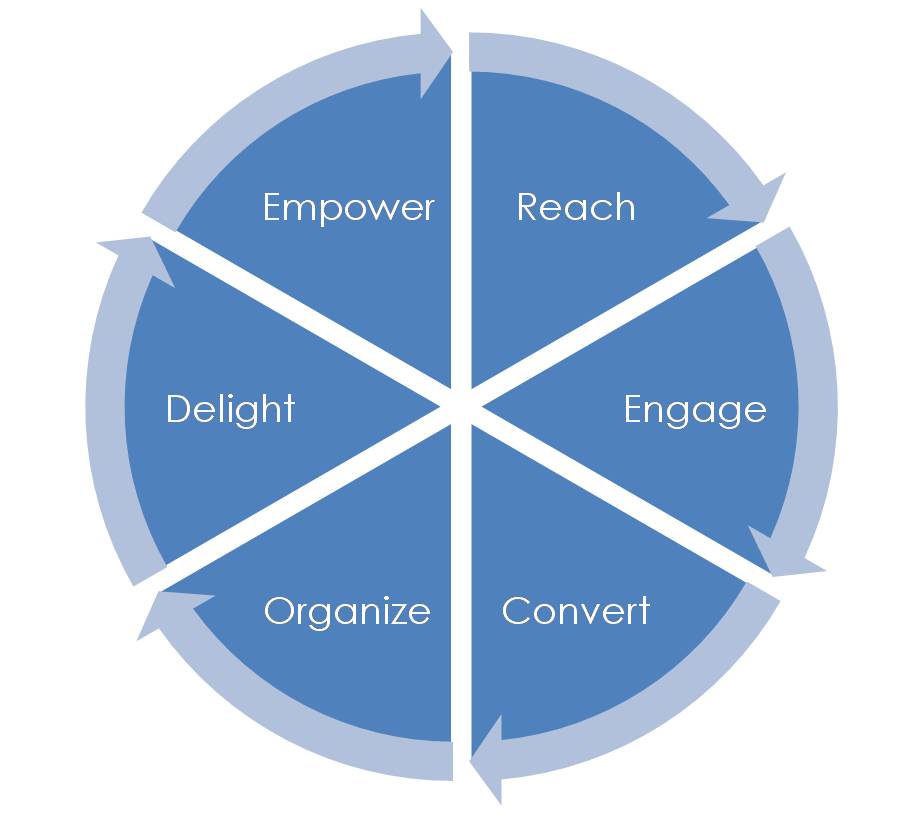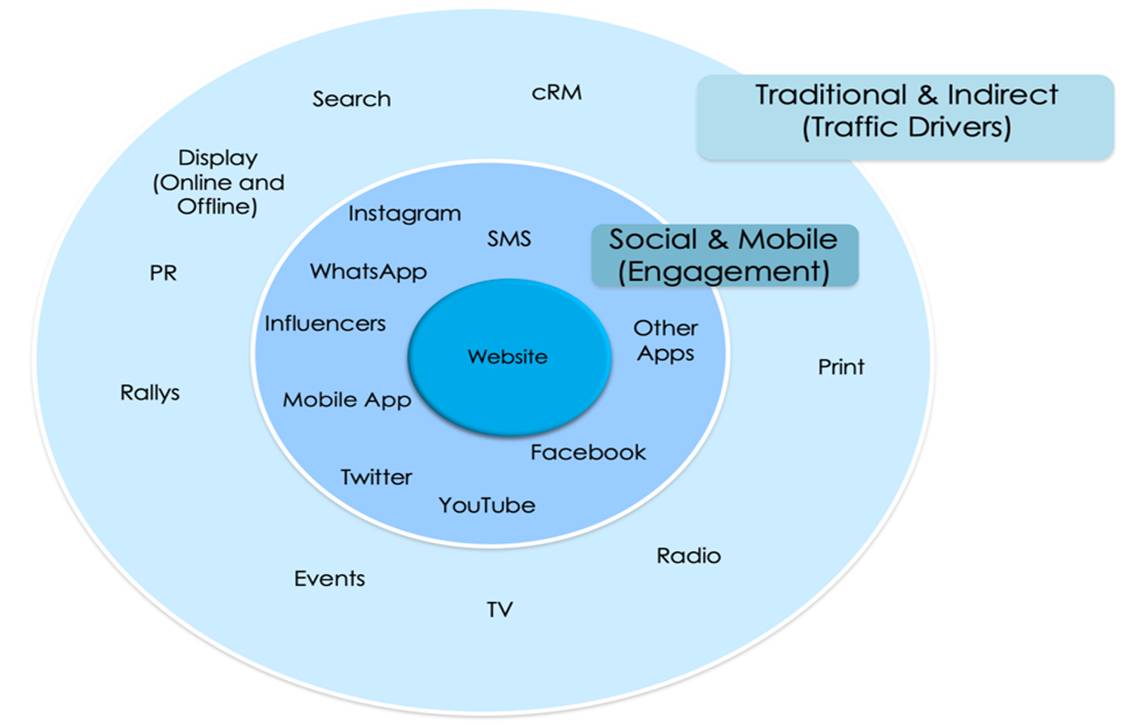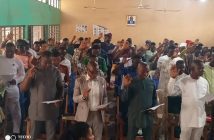Since 2008, political parties and candidates have sought to leverage digital technology for electoral success.
In 2008, Nana Akufo-Addo, the NPP Candidate used IVR (Interactive Voice Response) to reach out to voters across the country with his message.
Some of the parties and candidates also created websites and Facebook accounts to share their message.
Perhaps they were learning from the example of Barack Obama of the US.
Indeed, it is widely believed that in 2008, the effective use of social media and other digital technology was the match-winner for Obama.
He effectively used these tools to organize his supporters, raise funds and communicate his campaign message so effectively that he was able to beat established politicians like Hilary Clinton and John McCain.
The use of social media and other digital tools has been part of our partisan elections in the last 3 elections in Ghana but the role has never been as significant as I expect it to be in 2020.
a. Digital penetration is very high, with over 48% of Ghana’s population active online and 20% of Ghana’s population active on Social Media.

b. The impact of the COVID-19 pandemic has been widespread and significant. To control the spread of COVID-19, several protocols have been introduced which would influence campaigning in the 2020 elections.
These include:
– Restrictions on social gatherings
– The ban on handshaking
– The need for social distancing
These restrictions will not allow the holding of political rallies with large crowds, handshaking etc.
Radio, television, print and outdoor will continue to be significant in the 2020 elections but I expect a surge in the use of digital technology.
Indeed, digital technology is the most effective for addressing the challenges posed by the restrictions imposed by COVID-19. Radio, TV, outdoor and other traditional media will continue to provide mass awareness but they are indirect and less suitable for the degree of engagement required for political elections.
I expect the parties, candidates, footsoldiers and supporters to be significantly active online, especially on social media inching closer 7th December 2020.
But, just like the case has been in the past, not all of them will be successful. This poor level of success has been largely because most of the attempts to leverage digital for political success have been ineffective and amateurish.
Without an effective strategy and execution, digital technology cannot enable electoral success. Strategy and execution may differ between campaigns but the process or pathway to success would be similar.
This process is what I have captured in a model I call RECODE.

- Reach: IDENTIFY and REACH target constituents/electorate to CONNECT with.
- Engage: LISTEN, UNDERSTAND and SHARE your message to build TRUST, AFFINITY and RELATIONSHIP.
- Convert: Convert fans and followers to LOYAL SUPPORTERS
- Organize: ORGANIZE supporters into a MOVEMENT that can DELIVER RESULTS
- Delight: Provide more of what is desired to ENCOURAGE LOYALTY, SPONSORSHIPS, DONATIONS etc.
- Empower: EQUIP and ENABLE members of the movement to operate as loyal ambassadors and footsoldiers for the campaign.
- Communication Ecosystem: An effective digital strategy and execution plan should include a carefully selected set of communication channels, with defined roles for each channel. This set of channels should be properly integrated and coordinated to form an effective communication ecosystem. In a digital age, this should have a website as the hub of the communication ecosystem. For an effective ecosystem, I recommend a model like fig.2 below. You don’t necessarily have to switch on all the platforms in this model. Let your strategy and local context determine the platforms you choose to switch on. The only must-have I suggest is to have a website, at least a 1-pager, be active on Facebook, WhatsApp and Twitter, and do not ignore traditional media.

- Don’t ignore popular and trendy platforms like WhatsApp, TikTok, USSD and IVR
- Online Listening and Monitoring: Your strategy and execution should include a system for online listening and monitoring. It goes without saying that without effective listening, candidates and parties will not be abreast with the key issues that influence the votes of the electorate and will not know the relevant on-going conversations that they will need to participate in. An effective system and process for listening and monitoring will enable the parties and the candidates to know the key issues that are of concern to the electorate at all levels, that could influence their votes.
- Think of a Movement: A study of how Tony Blair (1997), Barack Obama (2008 and 2012) and Donald Trump (2016) won their elections would reveal that their campaigns were run on the principles of movements and revolutions. An effective election campaign should have something that it stands for, something that the supporters would be passionate about and would feel energized to woo their friends and families to support.
- Content Pillars: It’s often said that content is king. Indeed, it is content that sells and tells the story of a brand, or a candidate in this case. An effective digital strategy should have a set of content pillars which should determine the content that is shared online as part of the campaign process. Start by looking at the campaign manifesto. Try and break it down into very engaging, shareable content for social media.
- Content Hub: An effective digital strategy and execution plan should also include a content hub. This should be a hub where content is created and distributed to the media, owned online platforms, campaign communicators, footsoldiers etc. From a content hub, the campaign can have control over the messaging from the center as well as have a consistent and regular production of relevant content to drive the campaign.
- Foot soldiers as influencers: Due to the restrictions on gatherings and the need for social distancing, campaigns are going to depend a lot more on local footsoldiers to drive the campaign at the grassroots. A good strategy and execution plan should include a system/process for enabling and empowering footsoldiers to become the influencers for the campaign at the grassroots level. Think of how effectively WhatsApp groups, Telegram, Zoom etc. can be used to facilitate the training, organization, equipping and monitoring of footsoldiers and their activities.
- Fundraising: Every campaign needs donations, large and small, from its supporters. We’ve seen mega-churches leverage mobile money and other payment platforms to mobilize funds for their projects. I expect smart campaigns to follow this example. Get your supporters to believe in your message and your cause and they will donate to it.





